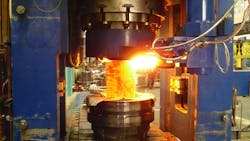SMS Completes Forging/Ring-Rolling Line for Ti Alloys
A combination forging/ring-rolling line designed and installed by SMS Group for VSMPO-Avisma Corporation gained a “final acceptance certificate,” the contractor announced recently. The plant in Yekaterinburg, an industrial city about 900 miles east of Moscow, manufactures rings in titanium alloys for jet engine programs.
No production cost for the project has been announced. SMS announced the contract for the combination forging and ring-rolling process in 2014, calling it “the first of its kind anywhere in the world.”
VSMPO-Avisma is an integrated mining and metallurgy group, and the world’s largest producer of titanium ingots and forged products. It has long-term titanium supply agreements in place with Boeing and Airbus, as well as jet-engine manufacturers. In recent years it has added a number of forging and machining capabilities, especially for commercial aerospace manufacturers, in addition to its titanium refining and alloying operations.
The ring-rolling operation involves a ring blank press, a radial-axial ring-rolling machine, and two ring expanders. The process manufactures titanium rings in diameters up to 3,500 mm, and up to 800 mm high.
SMS stated that its combination of forging and ring rolling make it possible to produce rings with “extremely complex inside and outside profiles,” with lower material volumes than VSMPO has required to produce similar products up to now.
About the Author
Robert Brooks
Editor/Content Director - Endeavor Business Media
Robert Brooks has been a business-to-business reporter, writer, editor, and columnist for more than 20 years, specializing in the primary metal and basic manufacturing industries. His work has covered a wide range of topics including process technology, resource development, material selection, product design, workforce development, and industrial market strategies, among others.
Currently, he specializes in subjects related to metal component and product design, development, and manufacturing—including castings, forgings, machined parts, and fabrications.
Brooks is a graduate of Kenyon College (B.A. English, Political Science) and Emory University (M.A. English.)


